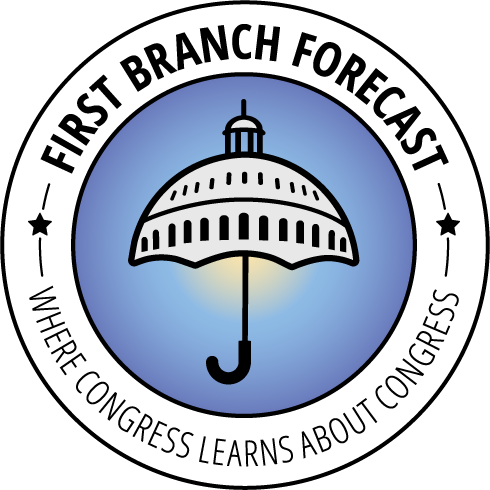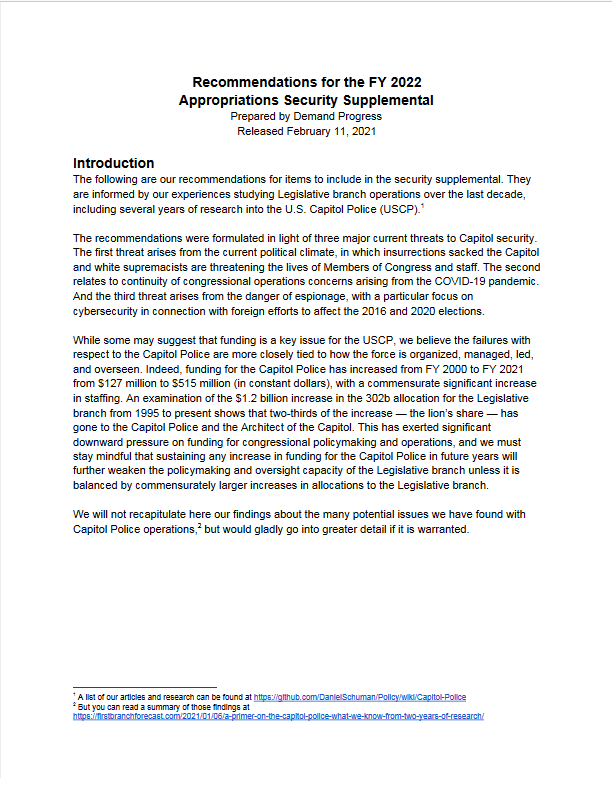Welcome to the First Branch Forecast, your weekly look into the Legislative branch and government transparency. (Was this email forwarded to you? Subscribe here.)
SUPPORTING CONGRESSIONAL STAFF + MEMBERS
The Office of Employee Assistance (OEA) and mental health inside the Legislative branch was the topic of the first Leg branch Appropriations subcommittee hearing for the FY 2022 appropriations cycle, which will have 14 hearings in total, the first three focusing on January 6th. We should note that Rep. Ryan has long made mental health and well-being a focus, and we applaud him and the committee for starting on this topic.
• Capitol Police. The hearing primarily revolved around resources OEA is providing USCP officers, congressional staffers, and essential workers on the Hill. OEA Director Tewsburky said the office currently has a total of 16 counselors, four of whom are professional crisis counselors with backgrounds in law enforcement trauma. Since January 6, OEA began deploying 24-hour counseling services for USCP officers, which have provided approximately 1,150 interactions, including 750 counseling sessions. These on-site counselors are being financed by USCP.
• Staff and essential workers support. OEA Director Tewsburky mentioned that OEA services were provided to over 3,000 people in 2020, and the office continues to work with contract companies to ensure contract workers are receiving the necessary support systems. Rep. Espelliat mentioned the critical need for diversity and representation for employees and officers of all backgrounds. Tewsburky mentioned that 50% of OEA professionals are African Americans, and they continue to connect employees to bilingual services to strengthen support.
• Telephone, not video. OEA is using telephonic services, not video, to hold sessions with staffers and officers. (In non-COVID time, some services would be offered in-person.) OEA said the transition to full telephonic support was seamless since they have used these types of services with district staffers for decades. Rep. Wexton mentioned she would like OEA to have the ability to use video counseling.
• More resources. Throughout the hearing, almost every single Member asked “What do you need from us?” The committee is apparently prepared to provide more resources so mental health and wellness services can be sustained at a higher level. Full Appropriations Chair DeLauro, who participated in the proceedings, echoed this sentiment during her opening remarks. Chair DeLauro and said she plans to attend as many Leg branch hearings as she can.
The experiences of Black staffers during the Trump insurrection — how close they came to violence, what it means for democracy, how they feel towards others — is the focus of an article by Luke Broadwater. In recent years there has been increasing research into the lack of diversity among Congressional staff and how that shapes the environment, with some of the most in-depth research conducted by Prof. James R. Jones of Rutgers, who has spoken about the Capitol’s racial caste system and is finishing up his new book, the Last Plantation, on racial inequality in the Congressional workplace. We have seen some efforts to address the staffer pipeline, such as the House’s creation of an Office of Diversity and Inclusion, the beginning of paid internships in both chambers (but not yet committees), a House study on staff pay and diversity, and a now quite-late Senate study on its staff, but there’s much more work to do.
Continue reading “Forecast for February 22, 2021”


